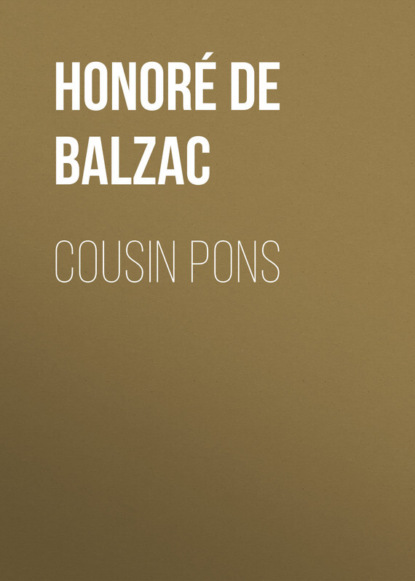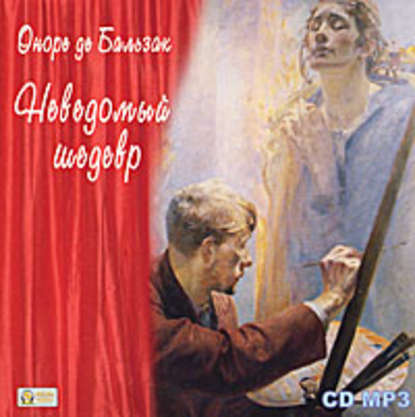
Полная версия
Cousin Pons

Honoré de Balzac
Cousin Pons
COUSIN PONS
Towards three o’clock in the afternoon of one October day in the year 1844, a man of sixty or thereabouts, whom anybody might have credited with more than his actual age, was walking along the Boulevard des Italiens with his head bent down, as if he were tracking some one. There was a smug expression about the mouth – he looked like a merchant who has just done a good stroke of business, or a bachelor emerging from a boudoir in the best of humors with himself; and in Paris this is the highest degree of self-satisfaction ever registered by a human countenance.
As soon as the elderly person appeared in the distance, a smile broke out over the faces of the frequenters of the boulevard, who daily, from their chairs, watch the passers-by, and indulge in the agreeable pastime of analyzing them. That smile is peculiar to Parisians; it says so many things – ironical, quizzical, pitying; but nothing save the rarest of human curiosities can summon that look of interest to the faces of Parisians, sated as they are with every possible sight.
A saying recorded of Hyacinthe, an actor celebrated for his repartees, will explain the archaeological value of the old gentleman, and the smile repeated like an echo by all eyes. Somebody once asked Hyacinthe where the hats were made that set the house in a roar as soon as he appeared. “I don’t have them made,” he said; “I keep them!” So also among the million actors who make up the great troupe of Paris, there are unconscious Hyacinthes who “keep” all the absurd freaks of vanished fashions upon their backs; and the apparition of some bygone decade will startle you into laughter as you walk the streets in bitterness of soul over the treason of one who was your friend in the past.
In some respects the passer-by adhered so faithfully to the fashions of the year 1806, that he was not so much a burlesque caricature as a reproduction of the Empire period. To an observer, accuracy of detail in a revival of this sort is extremely valuable, but accuracy of detail, to be properly appreciated, demands the critical attention of an expert flaneur; while the man in the street who raises a laugh as soon as he comes in sight is bound to be one of those outrageous exhibitions which stare you in the face, as the saying goes, and produce the kind of effect which an actor tries to secure for the success of his entry. The elderly person, a thin, spare man, wore a nut-brown spencer over a coat of uncertain green, with white metal buttons. A man in a spencer in the year 1844! it was as if Napoleon himself had vouchsafed to come to life again for a couple of hours.
The spencer, as its name indicates, was the invention of an English lord, vain, doubtless, of his handsome shape. Some time before the Peace of Amiens, this nobleman solved the problem of covering the bust without destroying the outlines of the figure and encumbering the person with the hideous boxcoat, now finishing its career on the backs of aged hackney cabmen; but, elegant figures being in the minority, the success of the spencer was short-lived in France, English though it was.
At the sight of the spencer, men of forty or fifty mentally invested the wearer with top-boots, pistachio-colored kerseymere small clothes adorned with a knot of ribbon; and beheld themselves in the costumes of their youth. Elderly ladies thought of former conquests; but the younger men were asking each other why the aged Alcibiades had cut off the skirts of his overcoat. The rest of the costume was so much in keeping with the spencer, that you would not have hesitated to call the wearer “an Empire man,” just as you call a certain kind of furniture “Empire furniture;” yet the newcomer only symbolized the Empire for those who had known that great and magnificent epoch at any rate de visu, for a certain accuracy of memory was needed for the full appreciation of the costume, and even now the Empire is so far away that not every one of us can picture it in its Gallo-Grecian reality.
The stranger’s hat, for instance, tipped to the back of his head so as to leave almost the whole forehead bare, recalled a certain jaunty air, with which civilians and officials attempted to swagger it with military men; but the hat itself was a shocking specimen of the fifteen-franc variety. Constant friction with a pair of enormous ears had left their marks which no brush could efface from the underside of the brim; the silk tissue (as usual) fitted badly over the cardboard foundation, and hung in wrinkles here and there; and some skin-disease (apparently) had attacked the nap in spite of the hand which rubbed it down of a morning.
Beneath the hat, which seemed ready to drop off at any moment, lay an expanse of countenance grotesque and droll, as the faces which the Chinese alone of all people can imagine for their quaint curiosities. The broad visage was as full of holes as a colander, honeycombed with the shadows of the dints, hollowed out like a Roman mask. It set all the laws of anatomy at defiance. Close inspection failed to detect the substructure. Where you expected to find a bone, you discovered a layer of cartilaginous tissue, and the hollows of an ordinary human face were here filled out with flabby bosses. A pair of gray eyes, red-rimmed and lashless, looked forlornly out of a countenance which was flattened something after the fashion of a pumpkin, and surmounted by a Don Quixote nose that rose out of it like a monolith above a plain. It was the kind of nose, as Cervantes must surely have explained somewhere, which denotes an inborn enthusiasm for all things great, a tendency which is apt to degenerate into credulity.
And yet, though the man’s ugliness was something almost ludicrous, it aroused not the slightest inclination to laugh. The exceeding melancholy which found an outlet in the poor man’s faded eyes reached the mocker himself and froze the gibes on his lips; for all at once the thought arose that this was a human creature to whom Nature had forbidden any expression of love or tenderness, since such expression could only be painful or ridiculous to the woman he loved. In the presence of such misfortune a Frenchman is silent; to him it seems the most cruel of all afflictions – to be unable to please!
The man so ill-favored was dressed after the fashion of shabby gentility, a fashion which the rich not seldom try to copy. He wore low shoes beneath gaiters of the pattern worn by the Imperial Guard, doubtless for the sake of economy, because they kept the socks clean. The rusty tinge of his black breeches, like the cut and the white or shiny line of the creases, assigned the date of the purchase some three years back. The roomy garments failed to disguise the lean proportions of the wearer, due apparently rather to constitution than to a Pythagorean regimen, for the worthy man was endowed with thick lips and a sensual mouth; and when he smiled, displayed a set of white teeth which would have done credit to a shark.
A shawl-waistcoat, likewise of black cloth, was supplemented by a white under-waistcoat, and yet again beneath this gleamed the edge of a red knitted under-jacket, to put you in mind of Garat’s five waistcoats. A huge white muslin stock with a conspicuous bow, invented by some exquisite to charm “the charming sex” in 1809, projected so far above the wearer’s chin that the lower part of his face was lost, as it were, in a muslin abyss. A silk watch-guard, plaited to resemble the keepsakes made of hair, meandered down the shirt front and secured his watch from the improbable theft. The greenish coat, though older by some three years than the breeches, was remarkably neat; the black velvet collar and shining metal buttons, recently renewed, told of carefulness which descended even to trifles.
The particular manner of fixing the hat on the occiput, the triple waistcoat, the vast cravat engulfing the chin, the gaiters, the metal buttons on the greenish coat, – all these reminiscences of Imperial fashions were blended with a sort of afterwaft and lingering perfume of the coquetry of the Incroyable – with an indescribable finical something in the folds of the garments, a certain air of stiffness and correctness in the demeanor that smacked of the school of David, that recalled Jacob’s spindle-legged furniture.
At first sight, moreover, you set him down either for the gentleman by birth fallen a victim to some degrading habit, or for the man of small independent means whose expenses are calculated to such a nicety that the breakage of a windowpane, a rent in a coat, or a visit from the philanthropic pest who asks you for subscriptions to a charity, absorbs the whole of a month’s little surplus of pocket-money. If you had seen him that afternoon, you would have wondered how that grotesque face came to be lighted up with a smile; usually, surely, it must have worn the dispirited, passive look of the obscure toiler condemned to labor without ceasing for the barest necessaries of life. Yet when you noticed that the odd-looking old man was carrying some object (evidently precious) in his right hand with a mother’s care; concealing it under the skirts of his coat to keep it from collisions in the crowd, and still more, when you remarked that important air always assumed by an idler when intrusted with a commission, you would have suspected him of recovering some piece of lost property, some modern equivalent of the marquise’s poodle; you would have recognized the assiduous gallantry of the “man of the Empire” returning in triumph from his mission to some charming woman of sixty, reluctant as yet to dispense with the daily visit of her elderly attentif.
In Paris only among great cities will you see such spectacles as this; for of her boulevards Paris makes a stage where a never-ending drama is played gratuitously by the French nation in the interests of Art.
In spite of the rashly assumed spencer, you would scarcely have thought, after a glance at the contours of the man’s bony frame, that this was an artist – that conventional type which is privileged, in something of the same way as a Paris gamin, to represent riotous living to the bourgeois and philistine mind, the most mirific joviality, in short (to use the old Rabelaisian word newly taken into use). Yet this elderly person had once taken the medal and the traveling scholarship; he had composed the first cantata crowned by the Institut at the time of the re-establishment of the Academie de Rome; he was M. Sylvain Pons, in fact – M. Sylvain Pons, whose name appears on the covers of well-known sentimental songs trilled by our mothers, to say nothing of a couple of operas, played in 1815 and 1816, and divers unpublished scores. The worthy soul was now ending his days as the conductor of an orchestra in a boulevard theatre, and a music master in several young ladies’ boarding-schools, a post for which his face particularly recommended him. He was entirely dependent upon his earnings. Running about to give private lessons at his age! – Think of it. How many a mystery lies in that unromantic situation!
But the last man to wear the spencer carried something about him besides his Empire Associations; a warning and a lesson was written large over that triple waistcoat. Wherever he went, he exhibited, without fee or charge, one of the many victims of the fatal system of competition which still prevails in France in spite of a century of trial without result; for Poisson de Marigny, brother of the Pompadour and Director of Fine Arts, somewhere about 1746 invented this method of applying pressure to the brain. That was a hundred years ago. Try if you can count upon your fingers the men of genius among the prizemen of those hundred years.
In the first place, no deliberate effort of schoolmaster or administrator can replace the miracles of chance which produce great men: of all the mysteries of generation, this most defies the ambitious modern scientific investigator. In the second – the ancient Egyptians (we are told) invented incubator-stoves for hatching eggs; what would be thought of Egyptians who should neglect to fill the beaks of the callow fledglings? Yet this is precisely what France is doing. She does her utmost to produce artists by the artificial heat of competitive examination; but, the sculptor, painter, engraver, or musician once turned out by this mechanical process, she no more troubles herself about them and their fate than the dandy cares for yesterday’s flower in his buttonhole. And so it happens that the really great man is a Greuze, a Watteau, a Felicien David, a Pagnesi, a Gericault, a Decamps, an Auber, a David d’Angers, an Eugene Delacroix, or a Meissonier – artists who take but little heed of grande prix, and spring up in the open field under the rays of that invisible sun called Vocation.
To resume. The Government sent Sylvain Pons to Rome to make a great musician of himself; and in Rome Sylvain Pons acquired a taste for the antique and works of art. He became an admirable judge of those masterpieces of the brain and hand which are summed up by the useful neologism “bric-a-brac;” and when the child of Euterpe returned to Paris somewhere about the year 1810, it was in the character of a rabid collector, loaded with pictures, statuettes, frames, wood-carving, ivories, enamels, porcelains, and the like. He had sunk the greater part of his patrimony, not so much in the purchases themselves as on the expenses of transit; and every penny inherited from his mother had been spent in the course of a three-years’ travel in Italy after the residence in Rome came to an end. He had seen Venice, Milan, Florence, Bologna, and Naples leisurely, as he wished to see them, as a dreamer of dreams, and a philosopher; careless of the future, for an artist looks to his talent for support as the fille de joie counts upon her beauty.
All through those splendid years of travel Pons was as happy as was possible to a man with a great soul, a sensitive nature, and a face so ugly that any “success with the fair” (to use the stereotyped formula of 1809) was out of the question; the realities of life always fell short of the ideals which Pons created for himself; the world without was not in tune with the soul within, but Pons had made up his mind to the dissonance. Doubtless the sense of beauty that he had kept pure and living in his inmost soul was the spring from which the delicate, graceful, and ingenious music flowed and won him reputation between 1810 and 1814.
Every reputation founded upon the fashion or the fancy of the hour, or upon the short-lived follies of Paris, produces its Pons. No place in the world is so inexorable in great things; no city of the globe so disdainfully indulgent in small. Pons’ notes were drowned before long in floods of German harmony and the music of Rossini; and if in 1824 he was known as an agreeable musician, a composer of various drawing-room melodies, judge if he was likely to be famous in 183l! In 1844, the year in which the single drama of this obscure life began, Sylvain Pons was of no more value than an antediluvian semiquaver; dealers in music had never heard of his name, though he was still composing, on scanty pay, for his own orchestra or for neighboring theatres.
And yet, the worthy man did justice to the great masters of our day; a masterpiece finely rendered brought tears to his eyes; but his religion never bordered on mania, as in the case of Hoffmann’s Kreislers; he kept his enthusiasm to himself; his delight, like the paradise reached by opium or hashish, lay within his own soul.
The gift of admiration, of comprehension, the single faculty by which the ordinary man becomes the brother of the poet, is rare in the city of Paris, that inn whither all ideas, like travelers, come to stay for awhile; so rare is it, that Pons surely deserves our respectful esteem. His personal failure may seem anomalous, but he frankly admitted that he was weak in harmony. He had neglected the study of counterpoint; there was a time when he might have begun his studies afresh and held his own among modern composers, when he might have been, not certainly a Rossini, but a Herold. But he was alarmed by the intricacies of modern orchestration; and at length, in the pleasures of collecting, he found such ever-renewed compensation for his failure, that if he had been made to choose between his curiosities and the fame of Rossini – will it be believed? – Pons would have pronounced for his beloved collection.
Pons was of the opinion of Chenavard, the print-collector, who laid it down as an axiom – that you only fully enjoy the pleasure of looking at your Ruysdael, Hobbema, Holbein, Raphael, Murillo, Greuze, Sebastian del Piombo, Giorgione, Albrecht Durer, or what not, when you have paid less than sixty francs for your picture. Pons never gave more than a hundred francs for any purchase. If he laid out as much as fifty francs, he was careful to assure himself beforehand that the object was worth three thousand. The most beautiful thing in the world, if it cost three hundred francs, did not exist for Pons. Rare had been his bargains; but he possessed the three qualifications for success – a stag’s legs, an idler’s disregard of time, and the patience of a Jew.
This system, carried out for forty years, in Rome or Paris alike, had borne its fruits. Since Pons returned from Italy, he had regularly spent about two thousand francs a year upon a collection of masterpieces of every sort and description, a collection hidden away from all eyes but his own; and now his catalogue had reached the incredible number of 1907. Wandering about Paris between 1811 and 1816, he had picked up many a treasure for ten francs, which would fetch a thousand or twelve hundred to-day. Some forty-five thousand canvases change hands annually in Paris picture sales, and these Pons had sifted through year by year. Pons had Sevres porcelain, pate tendre, bought of Auvergnats, those satellites of the Black Band who sacked chateaux and carried off the marvels of Pompadour France in their tumbril carts; he had, in fact, collected the drifted wreck of the seventeenth and eighteenth centuries; he recognized the genius of the French school, and discerned the merit of the Lepautres and Lavallee-Poussins and the rest of the great obscure creators of the Genre Louis Quinze and the Genre Louis Seize. Our modern craftsmen now draw without acknowledgment from them, pore incessantly over the treasures of the Cabinet des Estampes, borrow adroitly, and give out their pastiches for new inventions. Pons had obtained many a piece by exchange, and therein lies the ineffable joy of the collector. The joy of buying bric-a-brac is a secondary delight; in the give-and-take of barter lies the joy of joys. Pons had begun by collecting snuff-boxes and miniatures; his name was unknown in bric-a-bracology, for he seldom showed himself in salesrooms or in the shops of well-known dealers; Pons was not aware that his treasures had any commercial value.
The late lamented Dusommerard tried his best to gain Pons’ confidence, but the prince of bric-a-brac died before he could gain an entrance to the Pons museum, the one private collection which could compare with the famous Sauvageot museum. Pons and M. Sauvageot indeed resembled each other in more ways than one. M. Sauvageot, like Pons, was a musician; he was likewise a comparatively poor man, and he had collected his bric-a-brac in much the same way, with the same love of art, the same hatred of rich capitalists with well-known names who collect for the sake of running up prices as cleverly as possible. There was yet another point of resemblance between the pair; Pons, like his rival competitor and antagonist, felt in his heart an insatiable craving after specimens of the craftsman’s skill and miracles of workmanship; he loved them as a man might love a fair mistress; an auction in the salerooms in the Rue des Jeuneurs, with its accompaniments of hammer strokes and brokers’ men, was a crime of lese-bric-a-brac in Pons’ eyes. Pons’ museum was for his own delight at every hour; for the soul created to know and feel all the beauty of a masterpiece has this in common with the lover – to-day’s joy is as great as the joy of yesterday; possession never palls; and a masterpiece, happily, never grows old. So the object that he held in his hand with such fatherly care could only be a “find,” carried off with what affection amateurs alone know!
After the first outlines of this biographical sketch, every one will cry at once, “Why! this is the happiest man on earth, in spite of his ugliness!” And, in truth, no spleen, no dullness can resist the counter-irritant supplied by a “craze,” the intellectual moxa of a hobby. You who can no longer drink of “the cup of pleasure,” as it has been called through all ages, try to collect something, no matter what (people have been known to collect placards), so shall you receive the small change for the gold ingot of happiness. Have you a hobby? You have transferred pleasure to the plane of ideas. And yet, you need not envy the worthy Pons; such envy, like all kindred sentiments, would be founded upon a misapprehension.
With a nature so sensitive, with a soul that lived by tireless admiration of the magnificent achievements of art, of the high rivalry between human toil and the work of Nature – Pons was a slave to that one of the Seven Deadly Sins with which God surely will deal least hardly; Pons was a glutton. A narrow income, combined with a passion for bric-a-brac, condemned him to a regimen so abhorrent to a discriminating palate, that, bachelor as he was, he had cut the knot of the problem by dining out every day.
Now, in the time of the Empire, celebrities were more sought after than at present, perhaps because there were so few of them, perhaps because they made little or no political pretension. In those days, besides, you could set up for a poet, a musician, or a painter, with so little expense. Pons, being regarded as the probable rival of Nicolo, Paer, and Berton, used to receive so many invitations, that he was forced to keep a list of engagements, much as barristers note down the cases for which they are retained. And Pons behaved like an artist. He presented his amphitryons with copies of his songs, he “obliged” at the pianoforte, he brought them orders for boxes at the Feydeau, his own theatre, he organized concerts, he was not above taking the fiddle himself sometimes in a relation’s house, and getting up a little impromptu dance. In those days, all the handsome men in France were away at the wars exchanging sabre-cuts with the handsome men of the Coalition. Pons was said to be, not ugly, but “peculiar-looking,” after the grand rule laid down by Moliere in Eliante’s famous couplets; but if he sometimes heard himself described as a “charming man” (after he had done some fair lady a service), his good fortune went no further than words.
It was between the years 1810 and 1816 that Pons contracted the unlucky habit of dining out; he grew accustomed to see his hosts taking pains over the dinner, procuring the first and best of everything, bringing out their choicest vintages, seeing carefully to the dessert, the coffee, the liqueurs, giving him of their best, in short; the best, moreover, of those times of the Empire when Paris was glutted with kings and queens and princes, and many a private house emulated royal splendours.
People used to play at Royalty then as they play nowadays at parliament, creating a whole host of societies with presidents, vice-presidents, secretaries and what not – agricultural societies, industrial societies, societies for the promotion of sericulture, viticulture, the growth of flax, and so forth. Some have even gone so far as to look about them for social evils in order to start a society to cure them.
But to return to Pons. A stomach thus educated is sure to react upon the owner’s moral fibre; the demoralization of the man varies directly with his progress in culinary sapience. Voluptuousness, lurking in every secret recess of the heart, lays down the law therein. Honor and resolution are battered in breach. The tyranny of the palate has never been described; as a necessity of life it escapes the criticism of literature; yet no one imagines how many have been ruined by the table. The luxury of the table is indeed, in this sense, the courtesan’s one competitor in Paris, besides representing in a manner the credit side in another account, where she figures as the expenditure.












